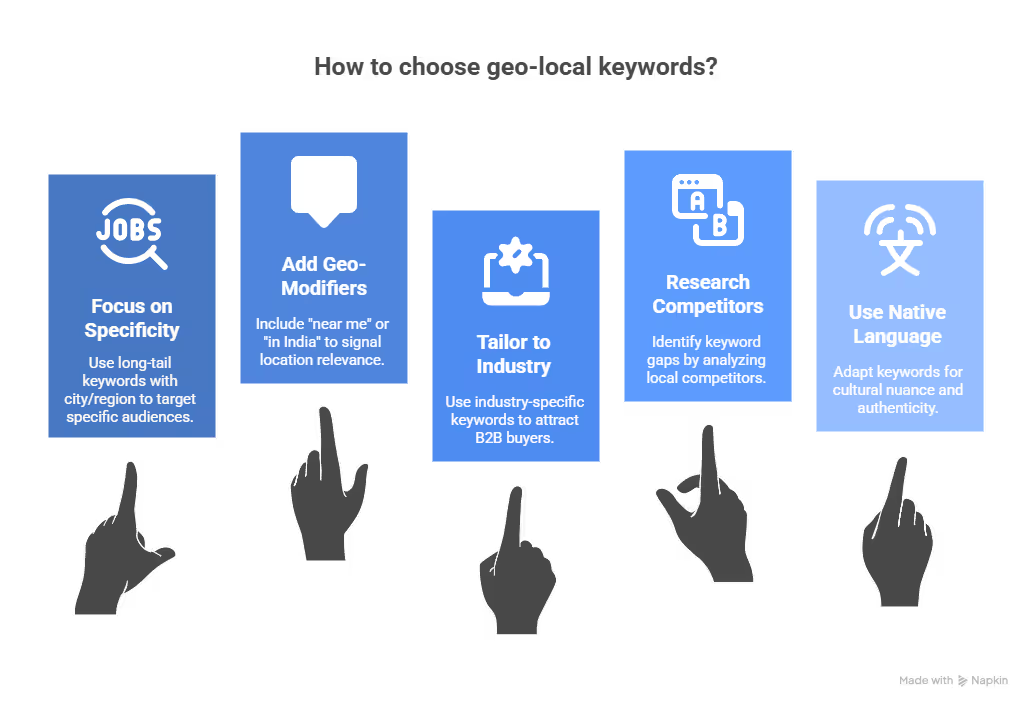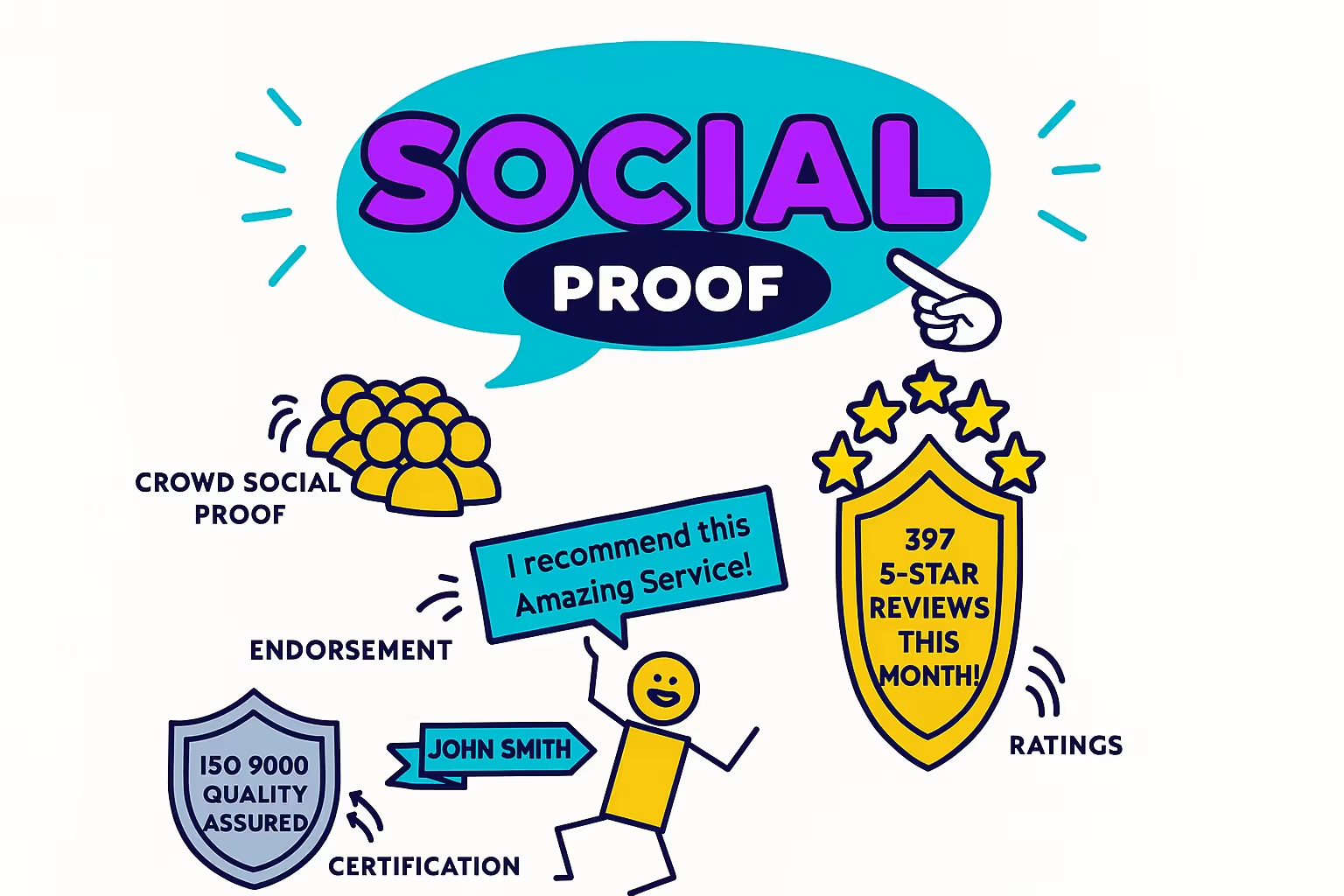How can global B2B brands use geo-local SEO to drive region-specific growth?
Why local SEO matters when you operate globally
Global visibility means nothing if your brand is invisible where it matters most, in the buyer’s region. For CMOs leading multinational B2B brands, the challenge isn’t ranking high on Google; it’s ranking right in every market.
From Mumbai to Madrid, local context now shapes every click, every lead, every deal. The next phase of SEO isn’t about chasing algorithms. It’s about understanding how geography, language, and industry nuance redefine buyer intent.
This is where region-aware optimisation becomes your competitive advantage, the difference between being seen and being chosen.
Half of all searches now carry local intent, and over 60% of internet users speak languages other than English. Localisation is therefore not an optional add‑on; it is a core growth lever. When brands adapt their messaging, language and search signals to specific regions, they build trust. Indeed, surveys indicate that around 72% of consumers prefer to buy from brands that speak their language.
For global B2B companies, the stakes are even higher. Long sales cycles involve multiple stakeholders, and buyers look for suppliers with deep local expertise. Remote work may have reduced the need for face‑to‑face meetings, yet local SEO remains crucial for B2B companies with a regional focus or physical presence.
Buyers often start with location‑based queries like “engineering consultants Mumbai” or “supply chain software Bangalore”. A region-aware approach blends local SEO with industry-focused strategies to ensure your brand shows up where and when your audience is searching.
You need to build a region‑aware keyword strategy
Map market readiness and demand
Before you invest in multi‑region SEO, determine whether the demand exists. International traffic patterns in Google Analytics and Search Console can reveal which regions are already sending visitors to your site.
Conduct market validation by analysing search volumes, digital adoption and competitor strength in each region using tools such as Ahrefs, Semrush or government trade portals. This helps prioritise markets with real potential rather than spreading resources thin across many countries.
How to choose geo-local keywords?
- Focus on specificity in geo-local SEO.
- Use long-tail keywords that include a city or region.
- Example: Instead of “CRM software,” use “best CRM software for healthcare startups in Bangalore.”
- Add geo-modifiers like “near me” or “in India” to signal location relevance to search engines.
- Tailor keywords to your industry, since B2B buyers search with precise intent.
- Prioritise long-tail, industry-focused phrases to attract qualified leads.
- Research local competitors to find keyword gaps and opportunities.
- Use native-language keyword research for authenticity.
- Avoid literal translations; adapt for idioms and cultural nuance.
- When unsure, consult native speakers or local marketing experts to ensure your messaging resonates.

Account for search engines and platforms per region
Not every region relies on Google. In China, Baidu dominates, while Yandex is a key player in Russia.
Tailor your SEO and content strategy to the platforms your audience uses. Optimise your profiles and content for local social networks. By appearing in the channels your prospects actually use, you increase visibility and trust.
Craft locally relevant content and thought leadership
Speak the native language and the culture, even on search engines
Localisation goes beyond translation. Localised marketing reshapes content, tone, images and even offers to match regional language and culture. Research indicates that adapting your message to local audiences increases trust and sales. Use local slang where appropriate, reference region‑specific holidays or regulations and reflect the realities of local buyers. People notice when a brand celebrates its customs and uses familiar idioms.
Your content should also reflect different buying cultures. An informal tone may work in the US, but could seem unprofessional in Germany or Japan.
This is why transcreation, which basically means ‘preserving the spirit of the message while adapting wording’, is often more effective than literal translation.
Create local industry hubs
Thought leadership has always been a pillar of B2B SEO. For geo‑local strategies, anchor that leadership in regional industry trends.
Altitude Marketing, which refers to creating content tailored to local industry trends or events, helps attract relevant traffic and establishes your company as a thought leader in the community.
For example, a manufacturing software provider targeting Northern India might publish a series on “Smart factory adoption in Punjab” with case studies from local clients.
This local‑industry content serves dual purposes: it ranks for geo‑modified keywords and demonstrates your expertise in that market.
Build region‑specific landing pages and content clusters
Leading B2B SEO guides recommend creating location‑specific landing pages for each office or service area. These pages should feature tailored content, testimonials and case studies relevant to that location.
Combine them with localised content marketing like articles on regulations, events or client stories. For example, if you serve manufacturing clients in Texas and Karnataka, build separate content hubs that speak to each region’s industrial landscape. This approach aligns with generative search engines’ preference for comprehensive topic clusters.
Emphasise user experience and accessibility
Quality content means little if users struggle to access it. Fast loading times, mobile‑friendly design and accessible navigation are key ranking factors. Search engines increasingly prioritise user engagement and Core Web Vitals.
Ensure your local pages are optimised for mobile, use proper heading structures, alt text and accessible design.
Keep the local UX preferences in mind: Japanese websites often pack more information on the homepage, whereas US sites favour minimalism. Adjust your layout accordingly.
Strengthen your technical foundation
Optimise Google Business Profile and local listings
Maintaining accurate business information is vital. Multiple sources highlight the importance of updating your Google Business Profile (formerly Google My Business). B2B companies should regularly update their contact information and service descriptions, and encourage customers to give reviews for their services. Positive reviews act as social proof, particularly for local B2B buyers.
Beyond Google, list your business on local directories and industry‑specific portals. Presence on directories such as Bing Places, Yelp or other niche directories increases local SEO signals. Ensure your Name, Address and Phone number (NAP) are consistent across all platforms. Inconsistencies can confuse search engines and dilute your local authority.
Implement geo‑technical best practices
Technical signals help search engines understand your geographic relevance. Geo SEO involves including city + service in title tags and H1 headers, using geo‑tagged images with metadata, and implementing Local Business schema.
You should also build geo‑sitemaps that highlight location‑specific pages and ensure your pages are crawlable and indexable.
For multi‑language or multi‑region sites, implement hreflang tags to signal the correct language and region to search engines. This prevents duplicate content issues and ensures users are served the most appropriate version of your site.
Use structured data with localised business information to improve visibility in local searches. Finally, ensure that each regional page loads quickly on both desktop and mobile devices; page speed remains a universal ranking factor.
Manage reviews and social proof
Reviews and testimonials carry weight in B2B purchasing decisions. Encourage clients to leave reviews on Google and industry platforms and respond to them promptly.
Positive local reviews build trust and influence rankings. Display industry‑specific badges (e.g., ISO certifications) and case studies on regional pages to strengthen authority and reassure local buyers.

Optimise for voice and AI‑driven search
As voice assistants and generative AI tools become common, search behaviour is evolving. Local voice search is important even with remote work.
People ask conversational questions like “Who are the best cloud consultants near me?” and expect immediate answers.
Generative search experiences (GE) and AI search engines analyse semantic relevance rather than just keywords.
AI systems prioritise conversational relevance, intent satisfaction and semantic depth.
Here’s how to focus on structured and distributed content strategies to strengthen your brand’s visibility in AI-driven search ecosystems -
- Organise content with clear headings, FAQs, and short, direct answers.
- Implement schema markup to help AI systems understand and categorise your content accurately.
- Diversify your web presence across forums, industry blogs, and podcasts to expand reach.
- Engage with third-party publications and thought leaders to build authority.
- Earn credible citations from trusted external sources
Tailor SEO to specific industries
Address regulatory and cultural considerations
Industry rules and compliance vary significantly across regions. A pharmaceutical firm selling into the EU must follow stringent GDPR and data‑protection rules.
Compliance with regulations such as GDPR and CCPA is essential. Ensure privacy policies are transparent and consent forms are localised. For industries like manufacturing or chemicals, country‑specific safety standards and certifications may influence search behaviour and content requirements.
Cultural context also affects how people search for industry terms. For instance, financial services clients in India may search for “NBFC loan management platform,” whereas those in the US might use “private credit servicing.”
Regularly review local industry news, regulatory updates and trade publications to identify trending topics and integrate them into your SEO strategy.
Build local authority through partnerships and backlinks
Backlinks remain a core off‑page signal. In local B2B SEO, quality and relevance matter more than sheer volume. Partnering with local trade organisations, chambers of commerce and industry publications can earn high‑quality backlinks.
Hosting webinars or contributing thought leadership articles to regional industry media not only builds links but also positions your brand as a local authority. Avoid buying links; ethical link‑building practices reinforce trust and align with Google’s emphasis on expertise and authority.
Invest in multilingual and multicultural SEO
With a majority of internet users speaking languages other than English, multilingual SEO is crucial for global industries. Key tactics include:
- Conduct keyword research in native languages, as direct translation misses idioms and cultural nuance.
- Use hreflang tags to serve the correct language and regional version of each page.
- Localise structured data and meta information to reflect regional context.
- Acquire backlinks from local domains; links from reputable local sites boost authority in that market.
For industries like software and technology, where products are similar across regions, adjust your messaging to reflect local compliance requirements and buyer priorities. For professional services, incorporate case studies featuring clients from each target market to show familiarity with local challenges.
Measure what matters and iterate
Ranking for a keyword is not enough. Tracking metrics such as organic traffic growth, engagement, lead quality and attribution. Report how SEO contributes to marketing‑qualified leads, pipeline volume and revenue instead of vanity metrics.
On regional pages, monitor local rankings, page visits, conversions and offline actions like visits to your office. Use this data to refine your geo‑local and industry strategies continually.
The competitive landscape will continue to evolve. Invest in evergreen content that can be updated easily, expand into multimedia formats like webinars and podcasts, and keep testing what resonates. Being first to adapt gives you an advantage when new search features roll out.
Local relevance drives global growth
Global B2B brands can no longer rely on one‑size‑fits‑all SEO. Decision‑makers expect partners who understand their region, language and industry.
A region‑aware strategy combines geo‑targeted keywords, culturally attuned content, technical best practices and industry‑specific insights.
By optimising for local search intent and multilingual audiences, updating profiles and listings, and building local authority, B2B brands stay visible where prospects are searching and signal that they belong in the market.

How Large Language Models Rank and Reference Brands?









